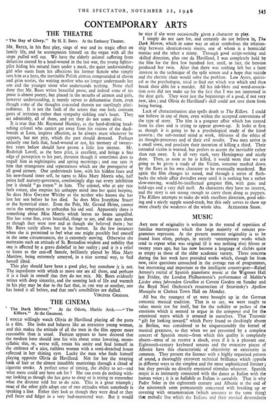THE CINEMA
I WOULD willingly watch Olivia de Havilland playing all the parts in a film. She looks and behaves like an attractive young woman, and this makes the attitude of all the men in the film appear more reasonable than is usual. Fashion appears to have decreed that the modern hero should lose his wits about some lowering, mono- syllabic slut, or, worse still, retain his sanity and find himself in the embrace of a nice, ruthless woman with a semi-detached house reflected in her shining eyes. Lucky the man who finds himself playing opposite Olivia de Havilland. Not for her the straying hank of hair or the almost inaudible mutterings through a cloud of cigarette smoke. A perfect sense of timing, the ability to act—and what more could any hero ask for ? She can even do nothing with- out looking as though she has gone to sleep or is trying to remember what the director told her to do next. This is a great triumph ; most of the other girls adopt one of two attitudes when somebody is speaking a line. Either they look as though they were dead or they pull faces and fidget in a very bad-mannered way. But it would
be nice if she were occasionally given a character to play.
I simply do not care for, and certainly do not believe in, The Dark Mirror, which in some way or other symbolises the relation- ship between identical-twin sisters, one of whom is a homicidal maniac and the other a ninny. Through good script-writing and skilled direction, plus one de Havilland, I was completely held by the film for the first few hundred feet, until, in fact, the heroine produced her twin. After that there was nothing left but a faint interest in the technique of the split screen and a hope that suicide and the electric chair would solve the problem. Lew Ayres, quizzi- cal as the psychologist, tried to find out which was which and thus break their alibi for a murder. All his ink-blots and word-associa- tion tests did not make up for the fact that I was not interested in the dear girls. They were just the beginnings of a good, if not very new, idea ; and Olivia de Havilland's skill could not save them from being boring.
Lack of characterisation also spells death to The Killers. I could not believe in any of them, even within the accepted conventions of the type of story. The film is a gangster affair which has strayed from its class and is trying to appear grown-up. It looks at first as though it is going to be a psychological study of the hired assassin ; the sub-normal mind at work, 3blivious of the ethics of its thought-processes and of their evil results. Two men arrive in a small town, and proclaim their intention of killing a third. Their intended victim is warned, but prefers to accept the inevitable rather than run away. It is all very stark, very Hemingway and nicely done. Then, as soon as he is killed, it would seem that we are going to be given a study of the Victim, someone marked down by the flaws in his own character to be eventually murdered. But again the film changes its mood, and through a series of flash- backs the whole affair dwindles away until it is nothing but a rather slow-moving, would-be-intellectual gangster film, with guns and hold-ups and a very dull moll. As characters they have no interest, and the story is not strong enough to carry them along as puppets. The Killers attempts to make do with excellent direction, good edit- ing and a nicely supple sound-track, but this only serves to show up more clearly the weakness of the whole idea. ALEXANDER SHAW.


































 Previous page
Previous page